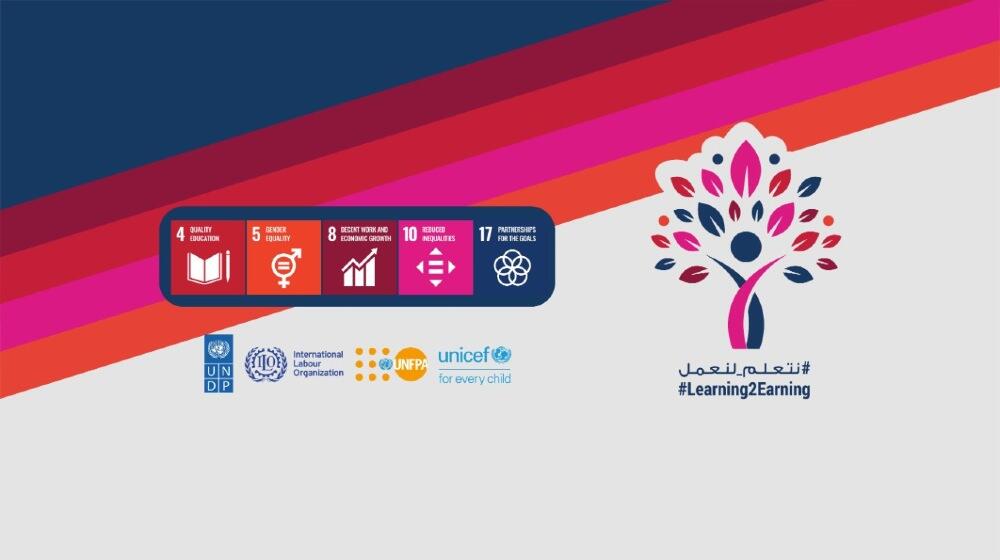Home to the highest rates of unemployed youth in the world, the region needs to create more than 33.3 million new jobs by 2030
Statement by Dr. Ruba Jaradat, ILO Regional Director for Arab States, Dr. Khalida Bouzar, UN Assistant Secretary General, Assistant Administrator and Director of the Regional Bureau for Arab States, UNDP, Dr. Luay Shabaneh, UNFPA Arab States Regional Office Regional Director, Adele Khodr, UNICEF Regional Director for the Middle East and North Africa
AMMAN, 23 May 2022 – “While children and young people make up almost half of the population, the Middle East and North Africa/ Arab States Region is home to the highest rates of youth unemployment in the world. Current education systems and curricula do not match the evolving labour market and the changing nature of work. They do not provide young people with enough skills, critical to success in today’s economy. These include communication, creativity, critical thinking, problem-solving and cooperation. Healthy, skilled and educated adolescents and youth can drive positive change towards a world fit for them that promotes and protects their rights.
“Our four United Nations agencies are holding a two-day high-level event in Amman, Jordan on young people's learning, skilling and transition to decent work. It aims to address means of strengthening links between learning and the labour market. These include enhancing education systems, including skilling and technical and vocational education and training, strengthening links between learning and the labour market, enhancing policies and exploring opportunities with the private sector to create jobs and support youth entrepreneurship.
“Youth continue to face a multitude of challenges in the region. The impact of the COVID-19 pandemic and its interruption of schooling has deepened the education crisis and widened existing
“Youth unemployment in the region is almost twice as high as the world average and has grown 2.5 times faster than world average between 2010 and 2021. It represents a significant drain on the economic potential of the region. The region is not able to take full advantage of its youth in enhancing prospects of economic growth and stability and peace. A shift in policy is required. The region needs to create more than 33.3 million new jobs by 2030, to reduce the overall unemployment rate to 5 per cent and to be able to absorb the large number of young people entering the workforce and stabilize youth unemployment.
“Young people need life skills education to help them explore and nurture positive values regarding their health, rights, families, relationships, gender roles and equality, and empower them to shape their lives and make informed decisions about their reproductive life.
“This event brings together young people, policymakers, the private sector and UN agencies in a direct dialogue on one of the most critical areas that impact young people’s lives in this region.
“We are committed to furthering an Action Agenda that prioritizes youth, their aspirations and needs in this region and fosters their capabilities and opportunities for decent work, now and in the long-term.”
ENDs-
For more information:
ILO
Salwa Kanaana, | Regional Communication & Public Information Officer, Arab States International Labour Organization, kanaana@ilo.org, +961 71 505958
UNDP
Saana Sarpo | Youth & Communications Specialist, Regional Hub for Arab States, saana.sarpo@undp.org, +962 (79) 953 3614
Noeman AlSayyad | Regional Communication Advisor, Regional Hub for Arab States, noeman.aisayyad@undp.org, +962 (79) 567 2901
UNFPA
Samir Aldarabi | Regional Communications Advisor, UNFPA Arab States Regional Office, aldarabi@unfpa.org, +201068484879
Rose Marie Gad | Communications Analyst, UNFPA Arab States Regional Office, gad@unfpa.org, +201021767215
UNICEF
Juliette Touma, | Regional Chief of Advocacy and Communications, UNICEF MENA, jtouma@unicef.org, +962798674628
Salim Oweis | Communications Officer, UNICEF MENA, soweis@unicef.org, +962799365212
Mohammad Hawari | Communications Officer, UNICEF MENA, mhawari@unicef.org, +962797564604


